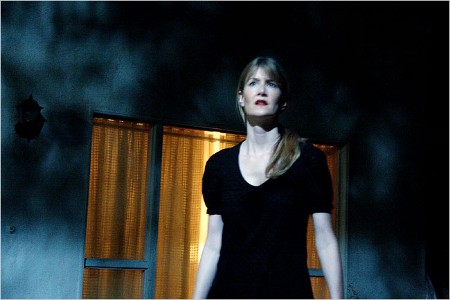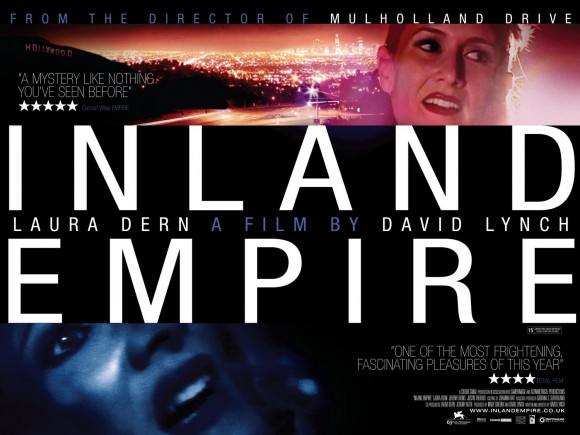David Lynch’s Inland Empire
Review by Nick Nihil
For all of his beloved and culturally influential works such as Twin Peaks, Blue Velvet, and Mulholland Dr., Inland Empire is David Lynch’s greatest work. Released in 2006 and not even grossing $1M in the U.S., due in no small part to its 3-hour running time and being easily his most abstract, surreal work since Eraserhead, viewers poo-pooehd or ignored it, seemingly relegating it to a footnote in his career. However, ignoring its nightmarish majesty under the perception that it’s too non-linear or calling it weird for its own sake does a disservice to the viewer, the film, and the intricate craft behind the film’s structure.
Yes, he wrote the screenplay as he filmed it. Yes, he worked in material from a series of webisodes from his official fan page that seemed to have no purpose to exist outside of them. Yes, it demands repeated viewings for which, and I can understand, people may well not have the time or patience. But the story is very much present and makes a lot of sense when viewed both through the lenses of themes he explored in Lost Highway and Mulholland Dr., and through his evolving spiritual practice. In Inland Empire he gives us the same story, a “cursed Polish-Gypsy folktale” told three different times with performers shifting roles in each iteration, along with new performers being drawn in to the cursed world of the story. To distill the narrative into its simplest form, Nikki (Laura Dern), the fading Hollywood star cast into the latest attempt at making this story, must break the curse or find herself and her costar murdered. At that level, it sounds like a cheesy fairy tale. Lynch then takes that simple premise to fully submerge into her fragmenting psyche, using that to explore the nature of acting as she loses the sense of reality between the film and her life, how Hollywood treats and abuses women, how men abuse women, while drawing on spiritual themes of inter-lifetime karmic contracts.

Laura Dern in Inland Empire (2006, Absurdia)
Setting aside the esoteric spirituality of the film, undoubtedly drawn heavily from his study of Transcendental Meditation, Lynch fully and fearlessly expands upon the simpler themes and methods of Lost Highway, and Mulholland Dr., both of which intend to clearly delineate fantasy and reality. After Fire Walk with Me bombed he took a hiatus from filmmaking and in that time seemed to change his tone. While in Blue Velvet and Twin Peaks he seemed to love the idea of apple-pie America as much as he distrusted it and loved to juxtapose a sense of Leave It to Beaver innocence against depraved inner-worlds, he jettisoned that tone with Lost Highway and shifted his settings from charming small towns to urban Los Angeles. Even though Naomi Watts affects that bygone innocence in Mulholland Dr., it was never to be trusted as it was in his earlier works, and Inland Empire puts that style to death (perhaps another reason it wasn’t so well-received).
This is a necessary evolution as his themes are no longer essentially two-tone, and he offers no easy answers. This is not to be intentionally “weird” so much as his themes no longer can be pandered to through easy answers or easy outs. The film is not so much structured as a straight line as it is a spiral, with scenes repeating themselves through different angles and contexts as in a house of mirrors. He has gone full bore into the messiness and the grey areas of the psyche and the soul, with each action having a different context and meaning once its repeated in the film, with different or expanded upon implications and motivations. Easy answers and explanations would, at this point, do a disservice to his themes and the depths he’s gone to explore them. And the depths to which he’s taken the film inspired both his most frightening imagery (the image of Laura Dern’s fish-lensed circus scream on the man in the hotel at the end), while also offering his most hopeful and beautiful ending of all of his works. Inland Empire stands as the most thoughtful, terrifying, well-crafted, and mature work of his career and deserves to be recognized as his magnum opus, the masterpiece of one of our greatest artists.
